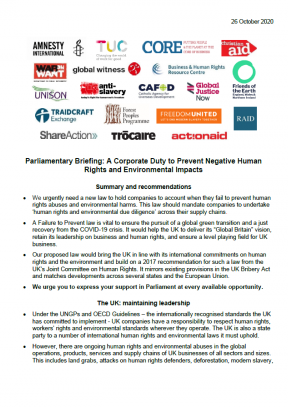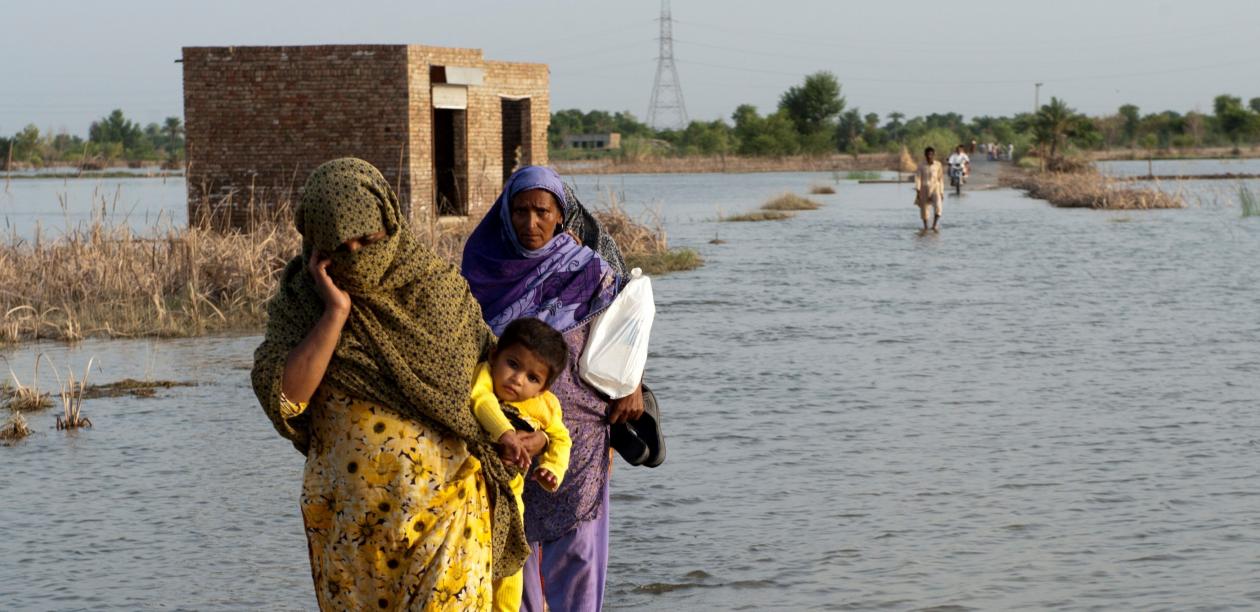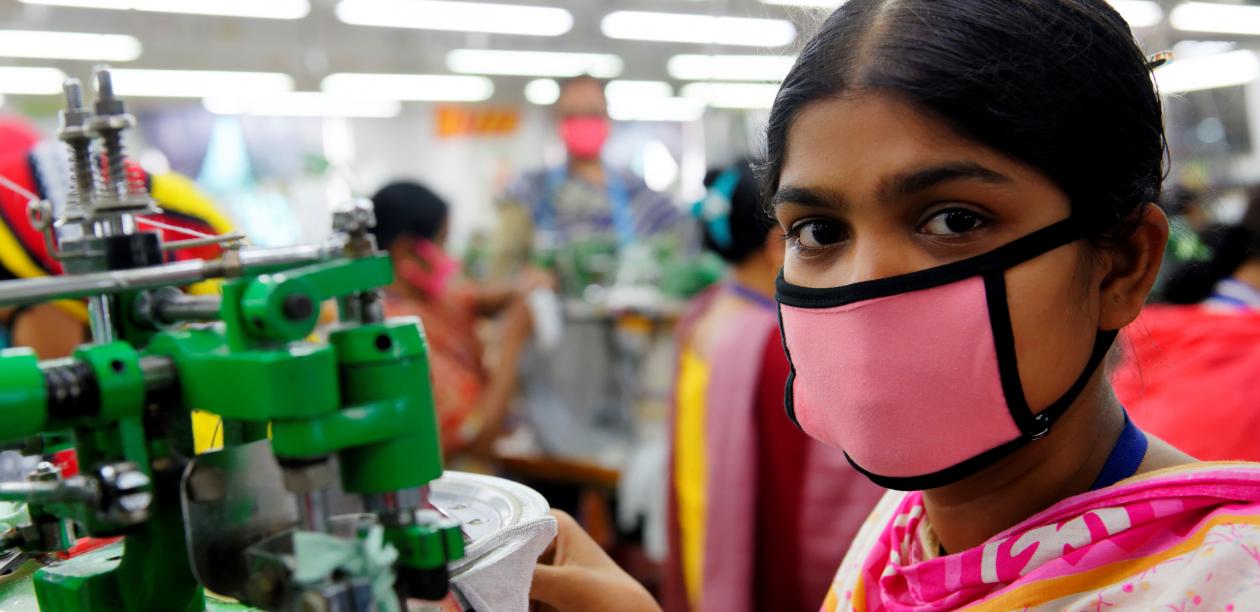Parliamentary Briefing: A Corporate Duty to Prevent Negative Human Rights and Environmental Impacts
This resource was published on
| Resources
Image

Parliamentary Briefing: A Corporate Duty to Prevent Negative Human Rights and Environmental Impacts
Summary and recommendations
- We urgently need a new law to hold companies to account when they fail to prevent human rights abuses and environmental harms. This law should mandate companies to undertake ‘human rights and environmental due diligence’ across their supply chains.
- A Failure to Prevent law is vital to ensure the pursuit of a global green transition and a just recovery from the COVID-19 crisis. It would help the UK to deliver its “Global Britain” vision, retain its leadership on business and human rights, and ensure a level playing field for UK business.
- Our proposed law would bring the UK in line with its international commitments on human rights and the environment and build on a 2017 recommendation for such a law from the UK’s Joint Committee on Human Rights. It mirrors existing provisions in the UK Bribery Act and matches developments across several states and the European Union.
- We urge you to express your support in Parliament at every available opportunity.
The UK: maintaining leadership
- Under the UNGPs and OECD Guidelines – the internationally recognised standards the UK has committed to implement - UK companies have a responsibility to respect human rights, workers’ rights and environmental standards wherever they operate. The UK is also a state party to a number of international human rights and environmental laws it must uphold.
- However, there are ongoing human rights and environmental abuses in the global operations, products, services and supply chains of UK businesses of all sectors and sizes. This includes land grabs, attacks on human rights defenders, deforestation, modern slavery, child labour, and other violations of labour rights - which disproportionately impact women, the majority of workers in labour intensive export production in low-income countries.
- Since the 2011 adoption of the UNGPs, there has been a global trend towards embedding the corporate responsibility to respect human rights, including the environment, into law. The UK’s Modern Slavery Act’s ‘Transparency in Supply Chains’ requirement was part of the first generation of such laws. States have since introduced obligations to take preventative action based on reporting (e.g., the Netherlands) and combined such obligations with legal liability when damage and loss occur (e.g., France). Laws are being developed in Switzerland, Germany and Finland.
- The EU’s commitment to introduce mandatory human rights and environmental due diligence legislation, including legal liability, consolidates these advances. The EU’s legislative proposal is expected to apply directly to all companies operating in the single market - which would include UK businesses – regardless of whether there is a trade agreement in place. A consultation on the law is due to begin imminently. Failure on the part of the UK to keep step with the EU on this issue would put UK business at a competitive disadvantage.
Widespread support for a new law
- The COVID-19 pandemic has exposed structural injustices in our economy and the burden of risk carried by workers and other groups in supply chains – particularly women workers, indigenous people and local communities – whether UK gig economy workers and those in the UK care and garment sectors, or workers in the Global South in the supply chains of UK companies hit by big brand cancellations. There is a growing consensus on the need for new laws to address supply chain injustices.
- Business: A survey by the British Institute of International and Comparative Law demonstrated that most businesses support new legislation due to anticipated benefits including legal certainty and a level playing field, mirroring business sentiment expressed across Europe. A group of 105 international investors representing US$5 trillion in assets under management has also called on governments to introduce due diligence legislation.
- UK public: Public opinion (p.72, table 9) across all ages strongly supports new rules to punish companies that do not act responsibly. Polling has also found that most younger Leave voters want big business regulation to increase (45%) or stay the same (7%) vs a minority (7%) who want less, and that two-thirds of people want the government to intervene to create a fairer economy after Covid-19.
- UK Parliament: The Joint Committee on Human Rights recommends that: “... the Government bring forward legislation to impose a duty on all companies to prevent human rights abuses…[which] would require all companies to put in place effective human rights due diligence processes … both for their subsidiaries and across their whole supply chain.”
- The Environment Bill: The UK Government plans to introduce a due diligence requirement focused on products associated with illegal deforestation which could form an amendment to the 2019-2021 Environment Bill – companies failing to comply will be subject to fines. The Global Resource Initiative taskforce (a group of businesses and NGOs convened by Defra, BEIS and DfID) recommends that such an obligation should cover both human rights and environmental risks and impacts. A separate amendment to the Bill - New Clause 5 - requires Government to publish legislation on human rights and environmental due diligence within six months of the Bill receiving royal assent.
A new Failure to Prevent law would build on proposed amendments to the Environment Bill and on the Modern Slavery Act’s Transparency in Supply Chains requirement. It would provide a stronger, overarching approach to tackling irresponsible business conduct across all human rights and environmental risks, that would complement and go beyond sectoral or issue-specific approaches.
A Failure to Prevent law: further detail
- A Failure to Prevent law should hold UK companies accountable if they fail to prevent harmful human rights or environmental impacts. The law should include effective and deterrent sanctions and liability provisions and provide for effective access to justice for victims.
- The law would require commercial organisations to conduct human rights and environmental due diligence - to identify and manage the risks that their activities pose - across their operations, subsidiaries and value chains – both in the UK and globally; tailored to specific risks and how they affect particular groups, such as women and children.
- The law should cover companies in all sectors and of all sizes carrying out business in the UK, with the scope of a company’s actions determined by its size, sector and activities. The finance sector would be included as would public sector bodies, including government departments, local authorities, development finance agencies and UK Export Finance.
- The law should be modelled on the civil and criminal duties to prevent tax evasion and bribery found in the Criminal Finances Act 2017 and the Bribery Act 2010. A 2020 study by the British Institute of International and Comparative Law confirms that this is legally feasible.
For more information, please contact: Louise Eldridge, Senior Policy and Communications Advisor, CORE Coalition: louise.eldridge@corporate-responsibility.org.
File
CORE F2P General Parliamentary Briefing.pdf
(284.14 KB)


